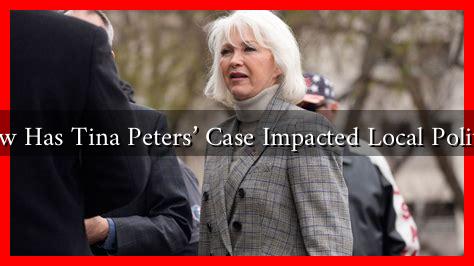-
Table of Contents
How Has Tina Peters’ Case Impacted Local Politics
The case of Tina Peters, the former Mesa County Clerk and Recorder in Colorado, has stirred significant controversy and debate within local politics. Peters gained national attention after she was accused of tampering with voting equipment and leaking sensitive election data. This article explores the implications of her case on local political dynamics, voter trust, and election integrity discussions.
The Background of Tina Peters’ Case
Tina Peters, a Republican, became embroiled in controversy during the 2020 presidential election cycle. Allegations surfaced that she had allowed unauthorized access to voting machines, which led to the exposure of sensitive election data. In 2021, Peters was indicted on multiple charges, including conspiracy to commit theft and criminal impersonation.
. Her actions raised questions about election security and the integrity of the electoral process.
Impact on Local Political Dynamics
The fallout from Peters’ case has had a profound impact on local politics in several ways:
- Polarization of Political Parties: Peters’ case has deepened the divide between Democrats and Republicans in Mesa County. Many Republicans rallied behind her, viewing her as a whistleblower exposing alleged election fraud, while Democrats condemned her actions as a threat to democracy.
- Increased Scrutiny of Election Officials: Peters’ case has led to heightened scrutiny of election officials across the state. Local election officials are now under pressure to demonstrate transparency and integrity in their operations.
- Emergence of New Political Movements: The controversy has given rise to new political movements focused on election integrity. Groups advocating for stricter election laws and transparency have gained traction, influencing local political agendas.
Voter Trust and Engagement
One of the most significant impacts of Peters’ case is the erosion of voter trust in the electoral process. According to a recent poll conducted by the Pew Research Center, nearly 60% of Americans believe that election fraud is a serious problem, despite evidence to the contrary. This perception has been exacerbated by Peters’ actions and the subsequent media coverage.
As a result, voter engagement has been affected in several ways:
- Decreased Voter Turnout: Distrust in the electoral process can lead to decreased voter turnout. Many citizens may feel that their votes do not matter if they believe the system is rigged.
- Increased Political Activism: Conversely, some citizens have become more politically active, motivated by a desire to protect election integrity. This has led to increased participation in local politics, including town hall meetings and community forums.
Case Studies and Examples
Several local elections have been influenced by the fallout from Peters’ case. For instance, in the 2022 midterm elections, candidates who aligned themselves with Peters’ narrative of election fraud saw a surge in support among certain voter demographics. Conversely, candidates who advocated for election transparency and integrity faced challenges in gaining traction.
Additionally, the case has prompted local governments to reevaluate their election security measures. In response to public concern, some counties have implemented new protocols for handling voting equipment and data, aiming to restore public confidence in the electoral process.
Conclusion: The Long-Term Implications
The case of Tina Peters has left an indelible mark on local politics in Colorado and beyond. It has polarized political parties, eroded voter trust, and sparked new movements focused on election integrity. As local governments grapple with the implications of her actions, the long-term effects on voter engagement and political dynamics remain to be seen.
Ultimately, Peters’ case serves as a cautionary tale about the fragility of public trust in democratic institutions. As communities navigate the complexities of election security and integrity, it is crucial for local leaders to prioritize transparency and accountability to rebuild that trust.
For more information on the implications of election integrity and local politics, you can visit Pew Research Center.





